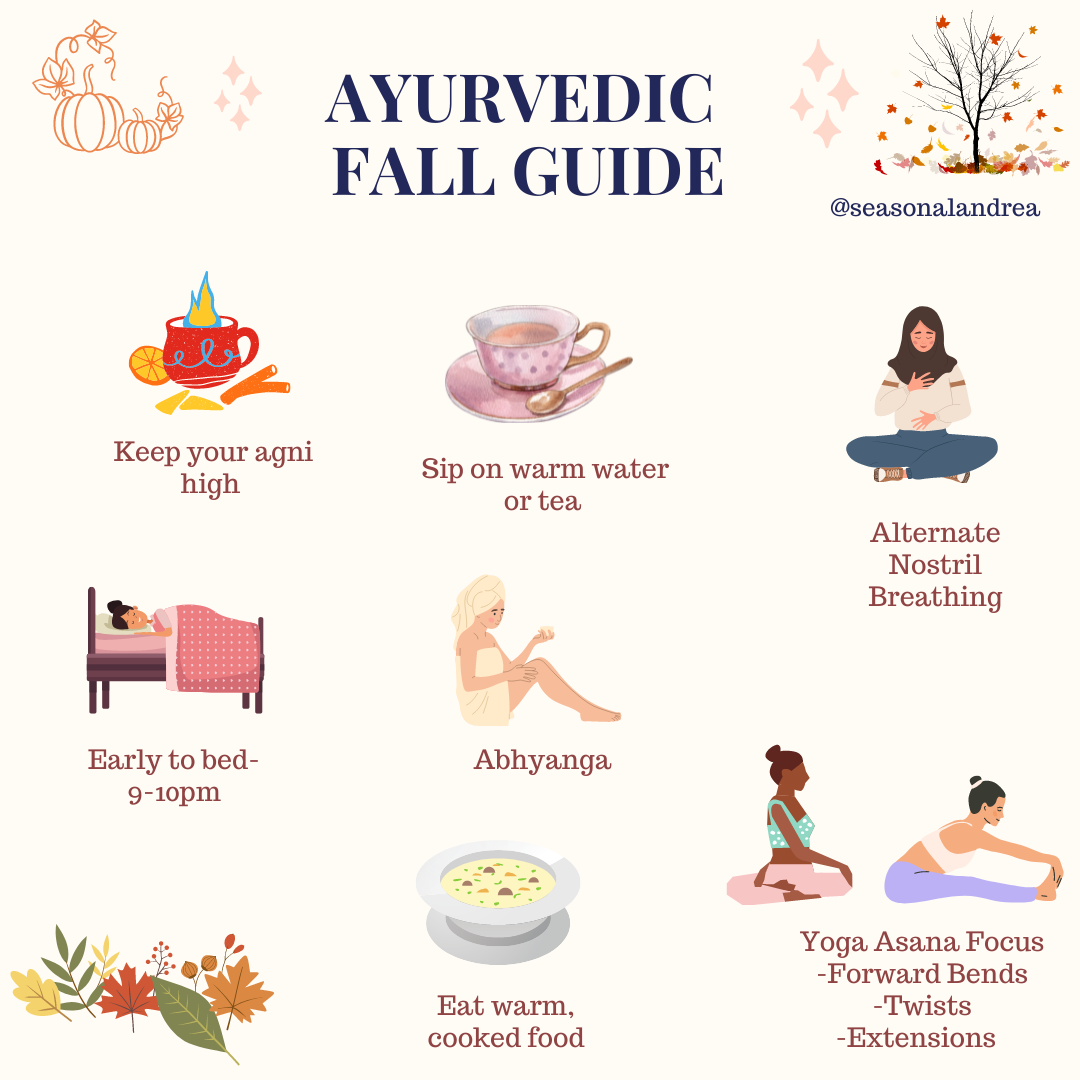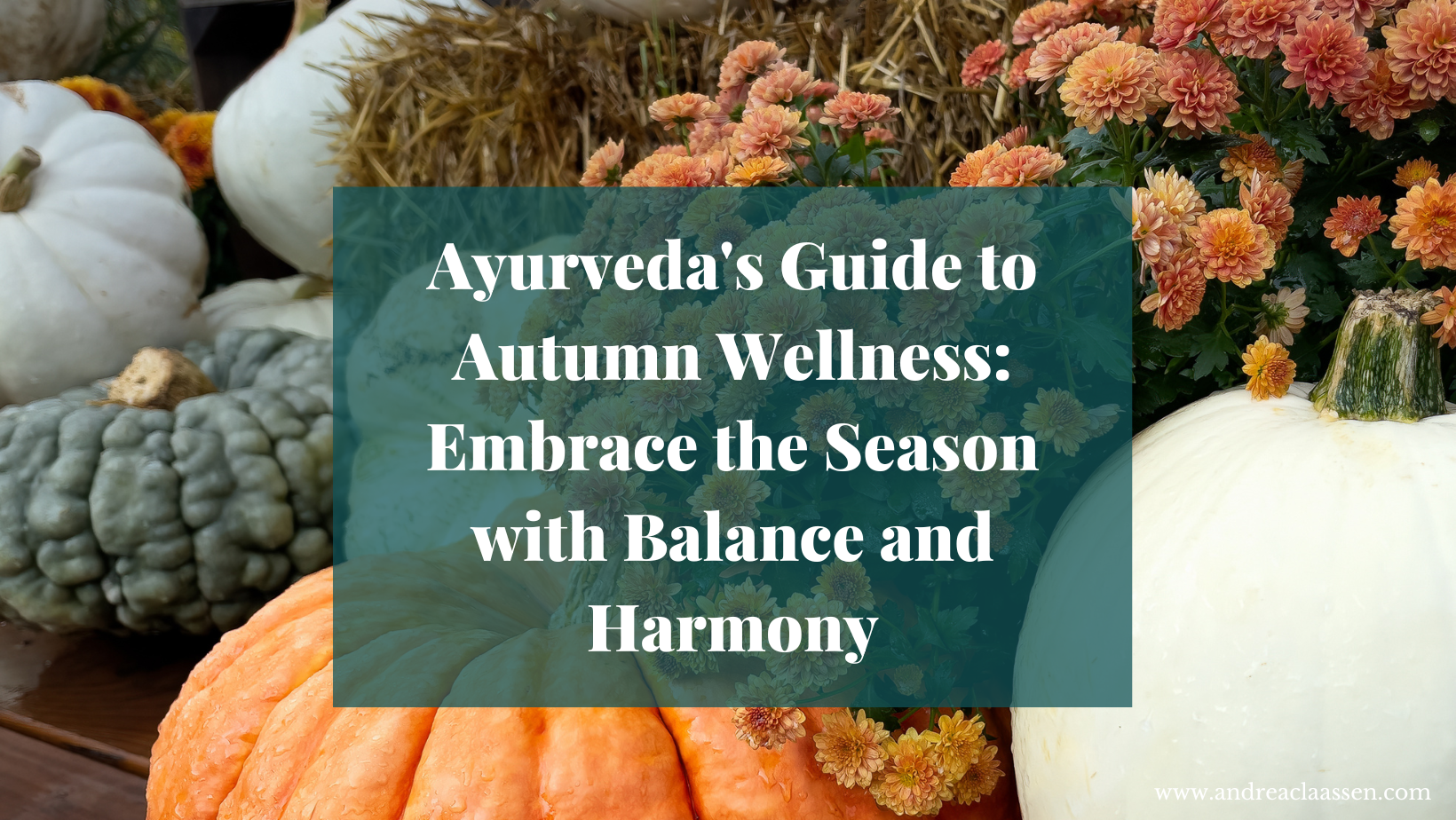Autumn Wellness
As the air becomes crisp and leaves begin to fall, we enter the season of autumn—a time of transformation in nature. In Ayurveda, autumn is associated with the Vata dosha, characterized by qualities of dryness, cold, and movement. Understanding how to balance these elements can help us maintain our health and wellness as we transition into this season.
This guide will explore Ayurvedic tips and practices to support your body and mind during autumn, ensuring you stay balanced, energized, and nourished.
Understanding Vata Dosha in Autumn
In Ayurveda, the three doshas—Vata, Pitta, and Kapha—are bio-energies that govern our physical and mental functions. Vata dosha, which consists of air and ether elements, is the most dominant during the autumn season. When Vata is out of balance, it can lead to issues such as dry skin, anxiety, digestive problems, and insomnia.
Signs of Imbalanced Vata in Autumn:
- Dry skin and hair
- Feeling anxious or restless
- Irregular digestion and bloating
- Difficulty sleeping or light sleep
- Feeling cold more easily
The key to autumn wellness in Ayurveda is to pacify the Vata dosha by bringing warmth, grounding, and moisture into your lifestyle.
Ayurvedic Diet for Autumn
Your diet plays a crucial role in balancing Vata during autumn. Focus on foods that are warm, moist, and grounding to counteract the dry and cold qualities of the season.
Foods to Include:
- Root Vegetables: Sweet potatoes, carrots, beets, and pumpkins are grounding and nourishing.
- Healthy Fats: Ghee, olive oil, and sesame oil help keep the body lubricated and warm.
- Warming Spices: Ginger, cinnamon, cumin, and turmeric aid in digestion and add warmth.
- Cooked Grains: Oatmeal, quinoa, and rice provide stability and are easy to digest.
Foods to Avoid:
- Cold salads and raw foods
- Carbonated drinks
- Dry snacks like crackers or chips
- Bitter and astringent foods
Eating at regular intervals and avoiding long gaps between meals will help keep your digestion strong and Vata balanced.
Daily Routine (Dinacharya) for Autumn Wellness
A consistent daily routine, or dinacharya, is essential in Ayurveda, especially during Vata season. It helps ground your energy and keeps your mind and body in harmony with the natural rhythm.
Morning Routine:
- Wake Up Early: Rise before sunrise to harness the calming energy of the morning.
- Tongue Scraping and Oil Pulling: These practices detoxify the body and promote oral health.
- Abhyanga (Self-Massage): Use warm sesame or almond oil to massage your body, calming the nervous system and keeping the skin hydrated.
- Warm Shower: Follow the massage with a warm shower to soothe muscles and stimulate circulation.
Evening Routine:
- Light Dinner: Finish eating at least 2-3 hours before bedtime with a warm, light meal.
- Herbal Tea: Sip on Vata-pacifying teas like chamomile, ashwagandha, or ginger to relax the body.
- Bedtime Rituals: Practice deep breathing exercises or meditation before sleeping to calm the mind and prepare for a restful night.
Download your free Ayurvedic Guide to Fall!
Learn even more practices to help you find your inner balance.

Ayurvedic Herbs for Seasonal Support
Certain Ayurvedic herbs can enhance your wellness routine during autumn by supporting digestion, immunity, and mental clarity.
Top Herbs for Autumn:
- Ashwagandha: Helps reduce stress and anxiety, promoting a sense of grounding.
- Triphala: Supports digestion and detoxification, keeping the digestive system balanced.
- Tulsi (Holy Basil): Boosts immunity and helps the body adapt to seasonal changes.
- Ginger: Warms the body and aids in digestion, combating Vata imbalances.
Incorporate these herbs into your diet through teas, supplements, or cooking to stay balanced and healthy throughout the season.
Embrace Mindfulness and Movement
Autumn is a perfect time to slow down and turn inward. Engaging in grounding practices like yoga, meditation, and breathwork can help stabilize Vata's fluctuating energy.
Yoga for Autumn:
- Focus on slow, grounding postures like Child’s Pose, Tree Pose, and Forward Fold.
- Incorporate a restorative yoga practice to calm the nervous system.
- Practice pranayama (breath control) techniques like Nadi Shodhana (alternate nostril breathing) to balance energy.
Meditation Tips:
- Meditate for at least 10 minutes daily to clear the mind and reduce anxiety.
- Use guided meditations that focus on grounding and stillness.
Lifestyle Tips to Keep Vata Balanced
- Stay Warm: Dress in layers, keep your home cozy, and avoid cold drafts.
- Hydrate: Drink plenty of warm water or herbal teas to stay hydrated and support digestion.
- Limit Screen Time: Reduce exposure to digital screens in the evening to promote better sleep.
- Create a Calm Environment: Surround yourself with calming scents like lavender or sandalwood to relax your mind.
Conclusion: Nurture Yourself with Ayurveda This Autumn
Ayurveda teaches us that staying in tune with the rhythms of nature is key to maintaining health and well-being. By making small adjustments to your diet, daily routine, and mindfulness practices, you can keep Vata in balance and enjoy a season of warmth, stability, and peace.
Embrace these Ayurvedic practices this autumn to feel more grounded, resilient, and in harmony with the changing season. Remember, wellness is a journey, and each step you take brings you closer to a state of holistic balance.

St. Paul/Minneapolis Support
If you're in the St. Paul, Minneapolis Area and are looking for a postpartum doula support person. I do offer in-home support from 1-6 weeks in duration. You can find out more about my offers below.
